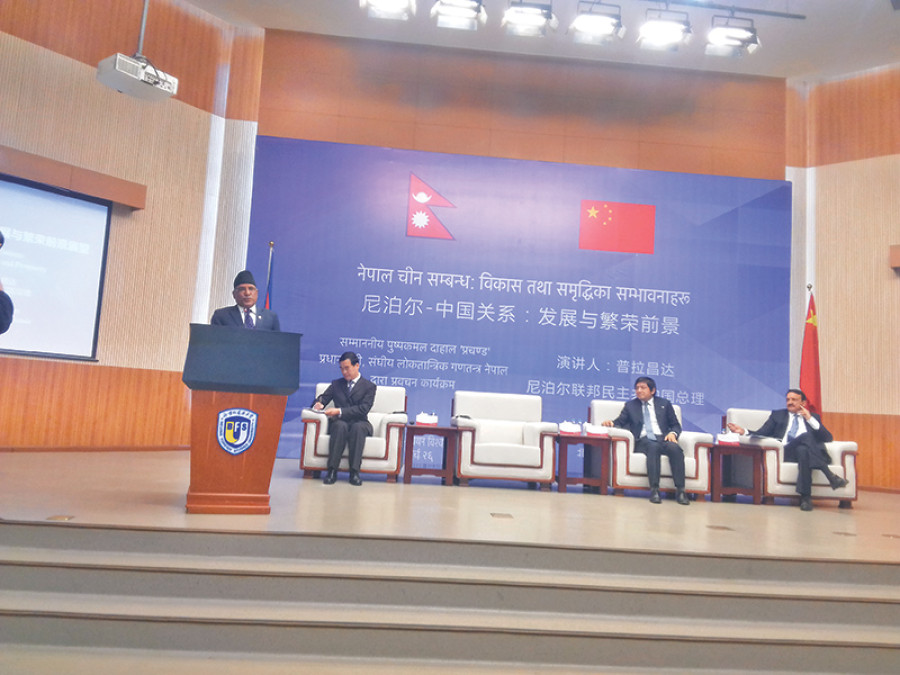National
PM: Partnership with China can change our economic landscape
Prime Minister Pushpa Kamal Dahal has claimed that partnership between Nepal and China in various sectors can change the economic landscape of Nepal.
Prime Minister Pushpa Kamal Dahal has claimed that partnership between Nepal and China in various sectors can change the economic landscape of Nepal.
Delivering a speech at the Beijing Foreign Studies University on Sunday, Dahal said China’s One Belt One Road initiative offers tremendous opportunities for collaboration and partnership, according to a statement issued by the PM’s secretariat.
“Looking back, some of you may be aware, Nepal used to be an important thoroughfare in the ancient silk route. It was a vibrant trade entrepôt that connected parts of Central Asia with South Asia,” said the PM, recalling a memorandum of understanding that Nepal signed in 2014 on the Belt and Road initiative—a flagship project of Chinese President Xi Jinping. Nepal was in the final stage of concluding the extended MoU.
“We remain committed to fully implementing the agreements and understandings reached in the past.”
Hailing the country’s engagement in the Beijing-headquartered Asian Infrastructure Bank, the PM expressed his satisfaction that Nepal became a Dialogue Partner of Shanghai Cooperation Organization last year. “And, most importantly, our bilateral engagement and business linkage is the major platform to harness the prospects for growth and prosperity.”
Prime Minister Dahal also highlighted the outcome of the Nepal Investment Summit held in Kathmandu, where more than 60 percent of the total investment pledges came from Chinese investors. He appreciated the fact that China tops the chart in terms of foreign direct investment inflows into Nepal.
The flow of Chinese tourists to Nepal is another important façade of bilateral relations and contributes to Nepal’s economic growth, he said. Nepal has waived visa fee for Chinese tourists, which he termed “a token of friendship”, according to the statement.
Dahal called the Agreement on Transit Transport signed between Nepal and China a deal of “paramount importance” for making landlocked Nepal a land-linked nation. Early conclusion of the protocol was his government’s priority, he said.
Stressing connectivity as Kathmandu’s key priority, he said that would mean connectivity of infrastructure as well as ideas and markets. “Connectivity of roads, railways, airways and web links can unleash the potential for shared prosperity.”
About the Tatopani border that remains closed since the 2015 earthquakes, the PM said: “In our annals of partnership, this port has a historical significance. Opening of more border points between our countries can strengthen cross-border connectivity.”
More flights and direct air links between Kathmandu and major cities of China, and harnessing water resources of Nepal through investment in mega projects could be beneficial to Nepal as well as Chinese investors, he suggested. He identified urban infrastructures, cross border transmission lines, telecommunication, and information and communication technology as areas in which Nepal and China can cooperate.
“Nepal’s location provides a unique opportunity for connecting China with South Asia. Harnessing this potential can bear fruits for China and Nepal as well as the region.
“We are aspiring to reach middle-income status by 2030. We count on China’s continued support in our economic transformation. And it is my belief that a prosperous Nepal is also in the interest of our friend China,” Dahal stressed.
Regardless of the political changes in Nepal, the country’s relations with China remained unshaken. “This is the constant of our relations.
“Principle of sovereign equality, non-interference, and respect for each other’s sensitivities have guided our strong friendship,” Dahal noted. Backing One-China policy, he said Nepal was committed to not allowing hostile activities against China on its soil. Dahal also inaugurated the Centre for Nepali Studies at the university.




 9.6°C Kathmandu
9.6°C Kathmandu













